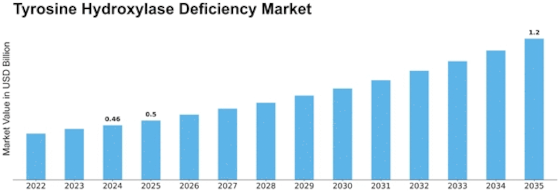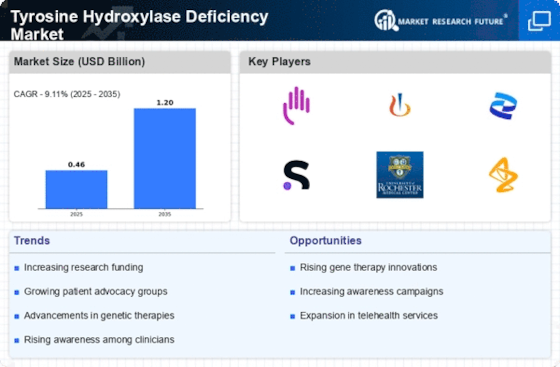Medication
Dietary Management
Gene Therapy
Genetic Testing
Clinical Evaluation
Biochemical Analysis
Infants
Children
Adults
Hospitals
Clinics
Research Institutes
North America
Europe
South America
Asia Pacific
Middle East and Africa
North America Outlook (USD Billion, 2019-2035)
North America Tyrosine Hydroxylase Deficiency Market by Treatment Type
Medication
Dietary Management
Gene Therapy
North America Tyrosine Hydroxylase Deficiency Market by Diagnosis Method Type
Genetic Testing
Clinical Evaluation
Biochemical Analysis
North America Tyrosine Hydroxylase Deficiency Market by Patient Age Group Type
Infants
Children
Adults
North America Tyrosine Hydroxylase Deficiency Market by End User Type
Hospitals
Clinics
Research Institutes
North America Tyrosine Hydroxylase Deficiency Market by Regional Type
US
Canada
US Outlook (USD Billion, 2019-2035)
US Tyrosine Hydroxylase Deficiency Market by Treatment Type
Medication
Dietary Management
Gene Therapy
US Tyrosine Hydroxylase Deficiency Market by Diagnosis Method Type
Genetic Testing
Clinical Evaluation
Biochemical Analysis
US Tyrosine Hydroxylase Deficiency Market by Patient Age Group Type
Infants
Children
Adults
US Tyrosine Hydroxylase Deficiency Market by End User Type
Hospitals
Clinics
Research Institutes
CANADA Outlook (USD Billion, 2019-2035)
CANADA Tyrosine Hydroxylase Deficiency Market by Treatment Type
Medication
Dietary Management
Gene Therapy
CANADA Tyrosine Hydroxylase Deficiency Market by Diagnosis Method Type
Genetic Testing
Clinical Evaluation
Biochemical Analysis
CANADA Tyrosine Hydroxylase Deficiency Market by Patient Age Group Type
Infants
Children
Adults
CANADA Tyrosine Hydroxylase Deficiency Market by End User Type
Hospitals
Clinics
Research Institutes
Europe Outlook (USD Billion, 2019-2035)
Europe Tyrosine Hydroxylase Deficiency Market by Treatment Type
Medication
Dietary Management
Gene Therapy
Europe Tyrosine Hydroxylase Deficiency Market by Diagnosis Method Type
Genetic Testing
Clinical Evaluation
Biochemical Analysis
Europe Tyrosine Hydroxylase Deficiency Market by Patient Age Group Type
Infants
Children
Adults
Europe Tyrosine Hydroxylase Deficiency Market by End User Type
Hospitals
Clinics
Research Institutes
Europe Tyrosine Hydroxylase Deficiency Market by Regional Type
Germany
UK
France
Russia
Italy
Spain
Rest of Europe
GERMANY Outlook (USD Billion, 2019-2035)
GERMANY Tyrosine Hydroxylase Deficiency Market by Treatment Type
Medication
Dietary Management
Gene Therapy
GERMANY Tyrosine Hydroxylase Deficiency Market by Diagnosis Method Type
Genetic Testing
Clinical Evaluation
Biochemical Analysis
GERMANY Tyrosine Hydroxylase Deficiency Market by Patient Age Group Type
Infants
Children
Adults
GERMANY Tyrosine Hydroxylase Deficiency Market by End User Type
Hospitals
Clinics
Research Institutes
UK Outlook (USD Billion, 2019-2035)
UK Tyrosine Hydroxylase Deficiency Market by Treatment Type
Medication
Dietary Management
Gene Therapy
UK Tyrosine Hydroxylase Deficiency Market by Diagnosis Method Type
Genetic Testing
Clinical Evaluation
Biochemical Analysis
UK Tyrosine Hydroxylase Deficiency Market by Patient Age Group Type
Infants
Children
Adults
UK Tyrosine Hydroxylase Deficiency Market by End User Type
Hospitals
Clinics
Research Institutes
FRANCE Outlook (USD Billion, 2019-2035)
FRANCE Tyrosine Hydroxylase Deficiency Market by Treatment Type
Medication
Dietary Management
Gene Therapy
FRANCE Tyrosine Hydroxylase Deficiency Market by Diagnosis Method Type
Genetic Testing
Clinical Evaluation
Biochemical Analysis
FRANCE Tyrosine Hydroxylase Deficiency Market by Patient Age Group Type
Infants
Children
Adults
FRANCE Tyrosine Hydroxylase Deficiency Market by End User Type
Hospitals
Clinics
Research Institutes
RUSSIA Outlook (USD Billion, 2019-2035)
RUSSIA Tyrosine Hydroxylase Deficiency Market by Treatment Type
Medication
Dietary Management
Gene Therapy
RUSSIA Tyrosine Hydroxylase Deficiency Market by Diagnosis Method Type
Genetic Testing
Clinical Evaluation
Biochemical Analysis
RUSSIA Tyrosine Hydroxylase Deficiency Market by Patient Age Group Type
Infants
Children
Adults
RUSSIA Tyrosine Hydroxylase Deficiency Market by End User Type
Hospitals
Clinics
Research Institutes
ITALY Outlook (USD Billion, 2019-2035)
ITALY Tyrosine Hydroxylase Deficiency Market by Treatment Type
Medication
Dietary Management
Gene Therapy
ITALY Tyrosine Hydroxylase Deficiency Market by Diagnosis Method Type
Genetic Testing
Clinical Evaluation
Biochemical Analysis
ITALY Tyrosine Hydroxylase Deficiency Market by Patient Age Group Type
Infants
Children
Adults
ITALY Tyrosine Hydroxylase Deficiency Market by End User Type
Hospitals
Clinics
Research Institutes
SPAIN Outlook (USD Billion, 2019-2035)
SPAIN Tyrosine Hydroxylase Deficiency Market by Treatment Type
Medication
Dietary Management
Gene Therapy
SPAIN Tyrosine Hydroxylase Deficiency Market by Diagnosis Method Type
Genetic Testing
Clinical Evaluation
Biochemical Analysis
SPAIN Tyrosine Hydroxylase Deficiency Market by Patient Age Group Type
Infants
Children
Adults
SPAIN Tyrosine Hydroxylase Deficiency Market by End User Type
Hospitals
Clinics
Research Institutes
REST OF EUROPE Outlook (USD Billion, 2019-2035)
REST OF EUROPE Tyrosine Hydroxylase Deficiency Market by Treatment Type
Medication
Dietary Management
Gene Therapy
REST OF EUROPE Tyrosine Hydroxylase Deficiency Market by Diagnosis Method Type
Genetic Testing
Clinical Evaluation
Biochemical Analysis
REST OF EUROPE Tyrosine Hydroxylase Deficiency Market by Patient Age Group Type
Infants
Children
Adults
REST OF EUROPE Tyrosine Hydroxylase Deficiency Market by End User Type
Hospitals
Clinics
Research Institutes
APAC Outlook (USD Billion, 2019-2035)
APAC Tyrosine Hydroxylase Deficiency Market by Treatment Type
Medication
Dietary Management
Gene Therapy
APAC Tyrosine Hydroxylase Deficiency Market by Diagnosis Method Type
Genetic Testing
Clinical Evaluation
Biochemical Analysis
APAC Tyrosine Hydroxylase Deficiency Market by Patient Age Group Type
Infants
Children
Adults
APAC Tyrosine Hydroxylase Deficiency Market by End User Type
Hospitals
Clinics
Research Institutes
APAC Tyrosine Hydroxylase Deficiency Market by Regional Type
China
India
Japan
South Korea
Malaysia
Thailand
Indonesia
Rest of APAC
CHINA Outlook (USD Billion, 2019-2035)
CHINA Tyrosine Hydroxylase Deficiency Market by Treatment Type
Medication
Dietary Management
Gene Therapy
CHINA Tyrosine Hydroxylase Deficiency Market by Diagnosis Method Type
Genetic Testing
Clinical Evaluation
Biochemical Analysis
CHINA Tyrosine Hydroxylase Deficiency Market by Patient Age Group Type
Infants
Children
Adults
CHINA Tyrosine Hydroxylase Deficiency Market by End User Type
Hospitals
Clinics
Research Institutes
INDIA Outlook (USD Billion, 2019-2035)
INDIA Tyrosine Hydroxylase Deficiency Market by Treatment Type
Medication
Dietary Management
Gene Therapy
INDIA Tyrosine Hydroxylase Deficiency Market by Diagnosis Method Type
Genetic Testing
Clinical Evaluation
Biochemical Analysis
INDIA Tyrosine Hydroxylase Deficiency Market by Patient Age Group Type
Infants
Children
Adults
INDIA Tyrosine Hydroxylase Deficiency Market by End User Type
Hospitals
Clinics
Research Institutes
JAPAN Outlook (USD Billion, 2019-2035)
JAPAN Tyrosine Hydroxylase Deficiency Market by Treatment Type
Medication
Dietary Management
Gene Therapy
JAPAN Tyrosine Hydroxylase Deficiency Market by Diagnosis Method Type
Genetic Testing
Clinical Evaluation
Biochemical Analysis
JAPAN Tyrosine Hydroxylase Deficiency Market by Patient Age Group Type
Infants
Children
Adults
JAPAN Tyrosine Hydroxylase Deficiency Market by End User Type
Hospitals
Clinics
Research Institutes
SOUTH KOREA Outlook (USD Billion, 2019-2035)
SOUTH KOREA Tyrosine Hydroxylase Deficiency Market by Treatment Type
Medication
Dietary Management
Gene Therapy
SOUTH KOREA Tyrosine Hydroxylase Deficiency Market by Diagnosis Method Type
Genetic Testing
Clinical Evaluation
Biochemical Analysis
SOUTH KOREA Tyrosine Hydroxylase Deficiency Market by Patient Age Group Type
Infants
Children
Adults
SOUTH KOREA Tyrosine Hydroxylase Deficiency Market by End User Type
Hospitals
Clinics
Research Institutes
MALAYSIA Outlook (USD Billion, 2019-2035)
MALAYSIA Tyrosine Hydroxylase Deficiency Market by Treatment Type
Medication
Dietary Management
Gene Therapy
MALAYSIA Tyrosine Hydroxylase Deficiency Market by Diagnosis Method Type
Genetic Testing
Clinical Evaluation
Biochemical Analysis
MALAYSIA Tyrosine Hydroxylase Deficiency Market by Patient Age Group Type
Infants
Children
Adults
MALAYSIA Tyrosine Hydroxylase Deficiency Market by End User Type
Hospitals
Clinics
Research Institutes
THAILAND Outlook (USD Billion, 2019-2035)
THAILAND Tyrosine Hydroxylase Deficiency Market by Treatment Type
Medication
Dietary Management
Gene Therapy
THAILAND Tyrosine Hydroxylase Deficiency Market by Diagnosis Method Type
Genetic Testing
Clinical Evaluation
Biochemical Analysis
THAILAND Tyrosine Hydroxylase Deficiency Market by Patient Age Group Type
Infants
Children
Adults
THAILAND Tyrosine Hydroxylase Deficiency Market by End User Type
Hospitals
Clinics
Research Institutes
INDONESIA Outlook (USD Billion, 2019-2035)
INDONESIA Tyrosine Hydroxylase Deficiency Market by Treatment Type
Medication
Dietary Management
Gene Therapy
INDONESIA Tyrosine Hydroxylase Deficiency Market by Diagnosis Method Type
Genetic Testing
Clinical Evaluation
Biochemical Analysis
INDONESIA Tyrosine Hydroxylase Deficiency Market by Patient Age Group Type
Infants
Children
Adults
INDONESIA Tyrosine Hydroxylase Deficiency Market by End User Type
Hospitals
Clinics
Research Institutes
REST OF APAC Outlook (USD Billion, 2019-2035)
REST OF APAC Tyrosine Hydroxylase Deficiency Market by Treatment Type
Medication
Dietary Management
Gene Therapy
REST OF APAC Tyrosine Hydroxylase Deficiency Market by Diagnosis Method Type
Genetic Testing
Clinical Evaluation
Biochemical Analysis
REST OF APAC Tyrosine Hydroxylase Deficiency Market by Patient Age Group Type
Infants
Children
Adults
REST OF APAC Tyrosine Hydroxylase Deficiency Market by End User Type
Hospitals
Clinics
Research Institutes
South America Outlook (USD Billion, 2019-2035)
South America Tyrosine Hydroxylase Deficiency Market by Treatment Type
Medication
Dietary Management
Gene Therapy
South America Tyrosine Hydroxylase Deficiency Market by Diagnosis Method Type
Genetic Testing
Clinical Evaluation
Biochemical Analysis
South America Tyrosine Hydroxylase Deficiency Market by Patient Age Group Type
Infants
Children
Adults
South America Tyrosine Hydroxylase Deficiency Market by End User Type
Hospitals
Clinics
Research Institutes
South America Tyrosine Hydroxylase Deficiency Market by Regional Type
Brazil
Mexico
Argentina
Rest of South America
BRAZIL Outlook (USD Billion, 2019-2035)
BRAZIL Tyrosine Hydroxylase Deficiency Market by Treatment Type
Medication
Dietary Management
Gene Therapy
BRAZIL Tyrosine Hydroxylase Deficiency Market by Diagnosis Method Type
Genetic Testing
Clinical Evaluation
Biochemical Analysis
BRAZIL Tyrosine Hydroxylase Deficiency Market by Patient Age Group Type
Infants
Children
Adults
BRAZIL Tyrosine Hydroxylase Deficiency Market by End User Type
Hospitals
Clinics
Research Institutes
MEXICO Outlook (USD Billion, 2019-2035)
MEXICO Tyrosine Hydroxylase Deficiency Market by Treatment Type
Medication
Dietary Management
Gene Therapy
MEXICO Tyrosine Hydroxylase Deficiency Market by Diagnosis Method Type
Genetic Testing
Clinical Evaluation
Biochemical Analysis
MEXICO Tyrosine Hydroxylase Deficiency Market by Patient Age Group Type
Infants
Children
Adults
MEXICO Tyrosine Hydroxylase Deficiency Market by End User Type
Hospitals
Clinics
Research Institutes
ARGENTINA Outlook (USD Billion, 2019-2035)
ARGENTINA Tyrosine Hydroxylase Deficiency Market by Treatment Type
Medication
Dietary Management
Gene Therapy
ARGENTINA Tyrosine Hydroxylase Deficiency Market by Diagnosis Method Type
Genetic Testing
Clinical Evaluation
Biochemical Analysis
ARGENTINA Tyrosine Hydroxylase Deficiency Market by Patient Age Group Type
Infants
Children
Adults
ARGENTINA Tyrosine Hydroxylase Deficiency Market by End User Type
Hospitals
Clinics
Research Institutes
REST OF SOUTH AMERICA Outlook (USD Billion, 2019-2035)
REST OF SOUTH AMERICA Tyrosine Hydroxylase Deficiency Market by Treatment Type
Medication
Dietary Management
Gene Therapy
REST OF SOUTH AMERICA Tyrosine Hydroxylase Deficiency Market by Diagnosis Method Type
Genetic Testing
Clinical Evaluation
Biochemical Analysis
REST OF SOUTH AMERICA Tyrosine Hydroxylase Deficiency Market by Patient Age Group Type
Infants
Children
Adults
REST OF SOUTH AMERICA Tyrosine Hydroxylase Deficiency Market by End User Type
Hospitals
Clinics
Research Institutes
MEA Outlook (USD Billion, 2019-2035)
MEA Tyrosine Hydroxylase Deficiency Market by Treatment Type
Medication
Dietary Management
Gene Therapy
MEA Tyrosine Hydroxylase Deficiency Market by Diagnosis Method Type
Genetic Testing
Clinical Evaluation
Biochemical Analysis
MEA Tyrosine Hydroxylase Deficiency Market by Patient Age Group Type
Infants
Children
Adults
MEA Tyrosine Hydroxylase Deficiency Market by End User Type
Hospitals
Clinics
Research Institutes
MEA Tyrosine Hydroxylase Deficiency Market by Regional Type
GCC Countries
South Africa
Rest of MEA
GCC COUNTRIES Outlook (USD Billion, 2019-2035)
GCC COUNTRIES Tyrosine Hydroxylase Deficiency Market by Treatment Type
Medication
Dietary Management
Gene Therapy
GCC COUNTRIES Tyrosine Hydroxylase Deficiency Market by Diagnosis Method Type
Genetic Testing
Clinical Evaluation
Biochemical Analysis
GCC COUNTRIES Tyrosine Hydroxylase Deficiency Market by Patient Age Group Type
Infants
Children
Adults
GCC COUNTRIES Tyrosine Hydroxylase Deficiency Market by End User Type
Hospitals
Clinics
Research Institutes
SOUTH AFRICA Outlook (USD Billion, 2019-2035)
SOUTH AFRICA Tyrosine Hydroxylase Deficiency Market by Treatment Type
Medication
Dietary Management
Gene Therapy
SOUTH AFRICA Tyrosine Hydroxylase Deficiency Market by Diagnosis Method Type
Genetic Testing
Clinical Evaluation
Biochemical Analysis
SOUTH AFRICA Tyrosine Hydroxylase Deficiency Market by Patient Age Group Type
Infants
Children
Adults
SOUTH AFRICA Tyrosine Hydroxylase Deficiency Market by End User Type
Hospitals
Clinics
Research Institutes
REST OF MEA Outlook (USD Billion, 2019-2035)
REST OF MEA Tyrosine Hydroxylase Deficiency Market by Treatment Type
Medication
Dietary Management
Gene Therapy
REST OF MEA Tyrosine Hydroxylase Deficiency Market by Diagnosis Method Type
Genetic Testing
Clinical Evaluation
Biochemical Analysis
REST OF MEA Tyrosine Hydroxylase Deficiency Market by Patient Age Group Type
Infants
Children
Adults
REST OF MEA Tyrosine Hydroxylase Deficiency Market by End User Type
Hospitals
Clinics
Research Institutes



















Leave a Comment